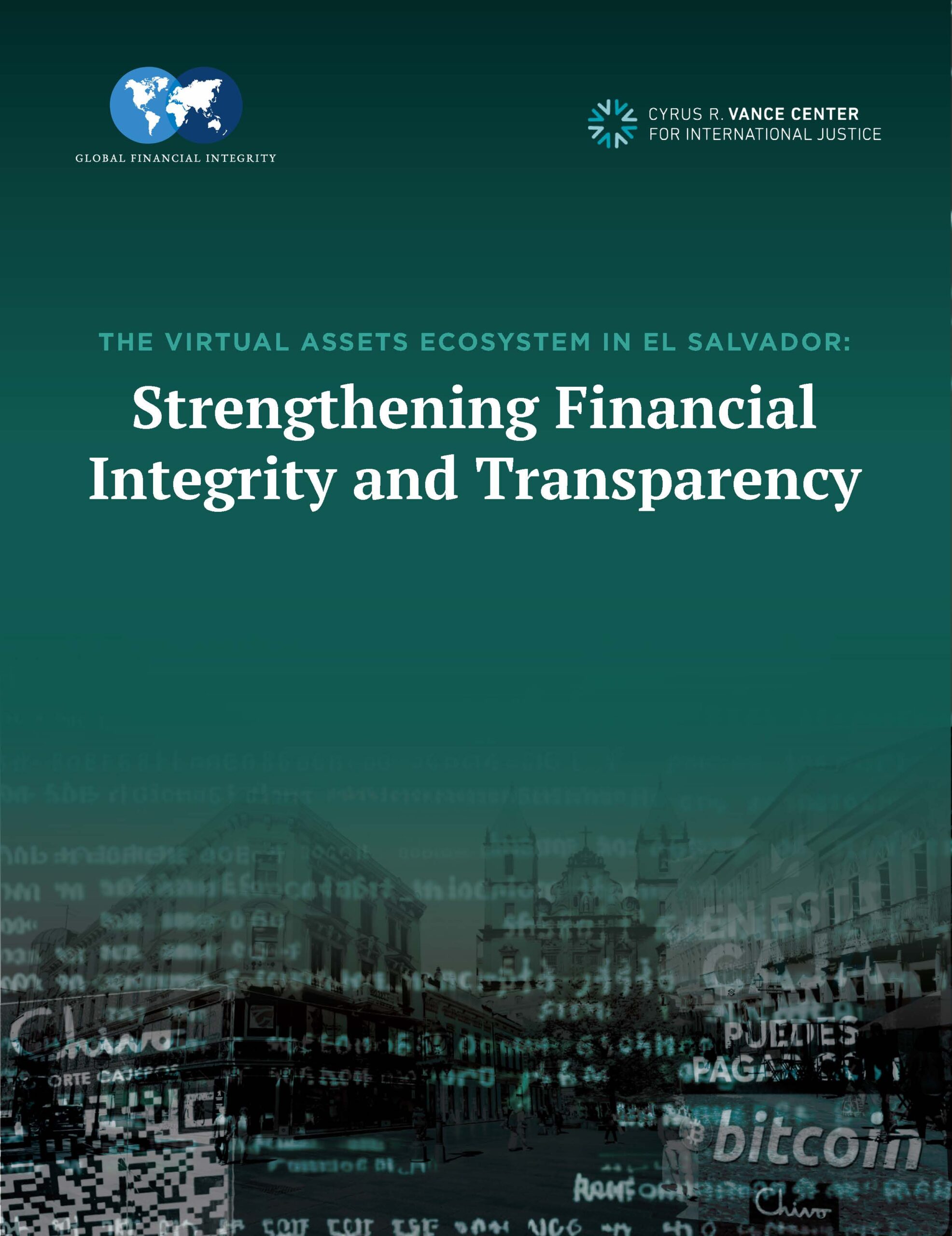October 18, 2023
A new joint publication by Global Financial Integrity (GFI) and the Cyrus R. Vance Center for International Justice (Vance Center) analyzes the legal framework for virtual assets in El Salvador and assesses financial crime risks.
This report comes at a critically important time. On September 7, 2021, El Salvador became the first country in the world to adopt Bitcoin as legal tender. Two years later, the country has enacted a series of laws and regulations regarding virtual assets and is preparing for its mutual evaluation by the Latin American Financial Action Group (GAFILAT). The mutual evaluation will assess the country’s measures to combat money laundering and the financing of terrorism in light of international standards.
At this important juncture, the report, titled The Virtual Assets Ecosystem in El Salvador: Strengthening Financial Integrity and Transparency, analyzes progress made by El Salvador as well as remaining challenges that need to be addressed. Through a balanced, technical discussion of these issues, the report aims to help El Salvador leverage the benefits of technological and financial innovation while also mitigating risks that may emerge.
Tom Cardamone, President and CEO of GFI, notes that “transparency enhances accountability. At the current time, more transparency is needed in the virtual asset sector to ensure these assets are not used for nefarious purposes.”
Jaime Chavez-Alor, Vance Center Latin America Policy Director, notes that “information, transparency, and integrity are key aspects to build trust around the virtual assets ecosystem and allow society to make informed decisions.”
The first half of the report analyzes the current regulatory landscape in El Salvador. El Salvador has taken a major leap in embracing technological innovation, specifically in the digitalization of the financial system. The country has established a regulatory framework encompassing the Bitcoin Law, the Digital Assets Issuance Law, and the Innovation and Manufacture of Technologies Promotion Law. These laws aim to provide a supportive environment for individuals and businesses engaging in transactions involving virtual assets while fostering innovation and technology manufacturing. As a result, El Salvador is poised to become a leading proponent of emerging technologies across various sectors of its economy. However, due to the dynamic nature of the subject matter and the ongoing efforts to standardize these frameworks internationally, the report identifies additional areas that still require regulation.
The second half of the report analyzes virtual assets in El Salvador from an anti-money laundering (AML) and countering the financing of terrorism (CFT) perspective. The report approaches these issues using guidance from the Financial Action Task Force (FATF), which states that “the cornerstone (…) is the risk-based approach which emphasizes the need for countries to identify and understand the money laundering (ML) and terrorism financing (TF) risks they are exposed to.” Understanding risks enables countries such as El Salvador to take mitigating measures and to deploy limited resources effectively.
The report analyzes financial crime risks for the most common predicate offenses for money laundering in El Salvador, considering drug trafficking, extortion, migrant smuggling, and misappropriation of public funds (peculado), with regards to virtual assets. The report also assesses financial crime risks related to specific operational features or developments within El Salvador’s virtual asset ecosystem.
The report concludes with policy recommendations that can help El Salvador maximize the benefits and minimize the risks associated with financial innovation. Key recommendations include:
- Policymakers in El Salvador should urgently adopt reforms strengthening AML/CFT as well as ensuring robust oversight over VAs and VASPs. These reforms are particularly important in light of El Salvador’s upcoming Mutual Evaluation.
- The Government of El Salvador, and specifically the Central Reserve Bank (BCR) and the National Commission of Digital Assets (NCDA), should engage with the legal and business community in developing regulations and technical standards.
- All relevant government agencies should ensure transparency and access to public information, including contractual and operational processes, fraud and mismanagement investigations, and the use of public funds, per domestic laws and international standards.
- The BCR should incorporate information on government Bitcoin purchases into the Balance of Payments and other similar documents.
- The Superintendence of the Financial System (SSF) should require that Chivo Wallet collect information on legal persons opening Chivo Wallet accounts in line with the requirements for legal persons to open other types of financial accounts. In addition, Chivo Wallet should maintain beneficial ownership information for legal persons using Chivo Wallet, similar to the requirements for financial institutions.
- Government agencies should increase supervision over virtual asset ATMS, especially those operating in high-risk jurisdictions such as gang-controlled neighborhoods or along smuggling or trafficking routes.
- The Financial Intelligence Unit (FIU) of El Salvador and other government authorities should provide education and training opportunities to the financial sector and other obligated entities regarding identification of red flag indicators in crypto transactions. This will help to ensure that suspicious transaction reports contain relevant information and reflect an informed understanding of the risks.
ABOUT GFI: Global Financial Integrity is a Washington, D.C.-based think tank, producing high-caliber analyses of illicit financial flows, advising developing country governments on effective policy solutions and promoting pragmatic transparency measures in the financial system to promote global development and security.
ABOUT The Vance Center: The Cyrus R. Vance Center for International Justice of the New York City Bar Association advances global justice by engaging lawyers across borders to support civil society and an ethically active legal profession. The Vance Center is a unique collaboration of international lawyers catalyzing public interest innovation that brings together leading law firms and other partners worldwide to pioneer international justice initiatives and provide pro bono legal representation to social justice NGOs.
CONTACT:
Katherin Alfonso
kalfonso@gfintegrity.org
Natalie Southwick
nsouthwick@nycbar.org
@VanceCenter

